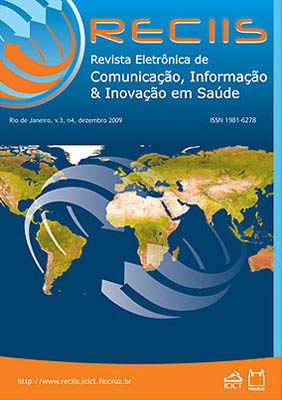Printed educational materials about sexual and reproductive health used in basic care in Belo Horizonte, MG: characterization and some considerations
DOI:
https://doi.org/10.3395/reciis.v3i4.727Keywords:
Educational materials, sexual health, reproductive health, teenagersAbstract
An initial analysis of printed educational materials used by the Municipal Health Office (MHO) of Belo Horizonte (BH) on themes linked to sexual and reproductive health was carried out. Premises were that health education is a practice developed at the social relations level and that mass media and daily interaction can be a link between the population and the health services. Printed material was collected from a Basic Health Unit (BHU) of the MHO/BH and its content was classified, described and analyzed. To study the meanings that teenagers attributed to the body’s sexual and reproductive dimensions, using one of the materials, a focal group was formed. Semi-structured interviews were carried out with health professionals. It should be emphasized that the materials are produced in a vertical manner, treating the target audience as an airtight and homogenous block, with the STD/AIDS thematic prevailing. Some of the materials focusing on aids display good quality, presenting an objective and clear language and pertinent illustrations. However, in the majority, the prevailing approach is that of the biomedical body in detriment to a broader approach to sexuality. Assessments and reception studies are needed so that the production of educational material can be linked to the target audience’s existential context and that quality criteria for these materials are included in health professionals’ training.Downloads
Published
How to Cite
Issue
Section
License
Author’s rights: The author retains unrestricted rights over his work.
Rights to reuse: Reciis adopts the Creative Commons License, CC BY-NC non-commercial attribution according to the Policy on Open Access to Knowledge by Oswaldo Cruz Foundation. With this license, access, download, copy, print, share, reuse, and distribution of articles is allowed, provided that it is for non-commercial use and with source citation, granting proper authorship credits and reference to Reciis. In such cases, no permission is required from the authors or editors.
Rights of authors’s deposit / self-archiving: The authors are encouraged to deposit the published version, along with the link of their article in Reciis, in institutional repositories.












